人教版(2019)选择性必修第二册:Unit 5 First Aid Grammar 复习动词ing的用法 课件 (33张ppt)
文档属性
| 名称 | 人教版(2019)选择性必修第二册:Unit 5 First Aid Grammar 复习动词ing的用法 课件 (33张ppt) | 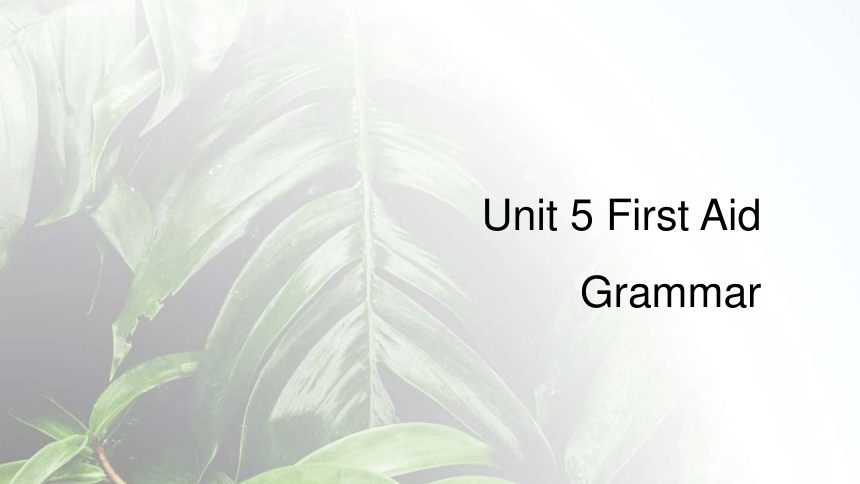 | |
| 格式 | pptx | ||
| 文件大小 | 1.7MB | ||
| 资源类型 | 教案 | ||
| 版本资源 | 人教版(2019) | ||
| 科目 | 英语 | ||
| 更新时间 | 2022-12-27 07:39:30 | ||
图片预览

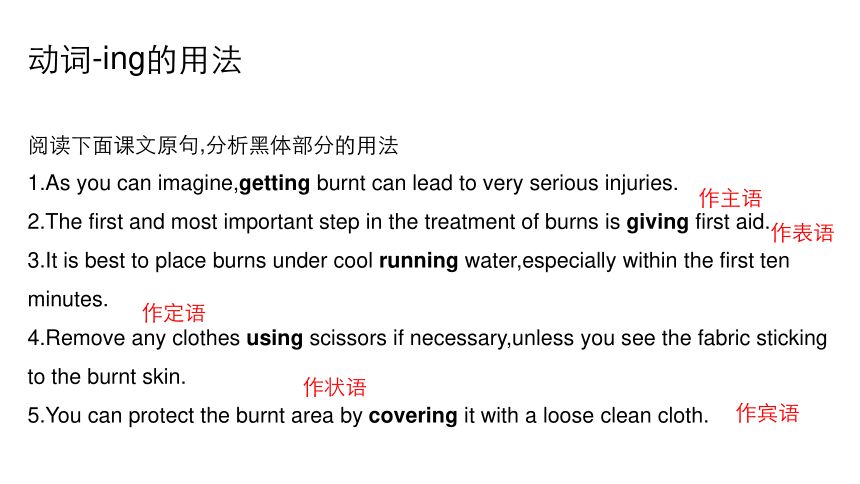
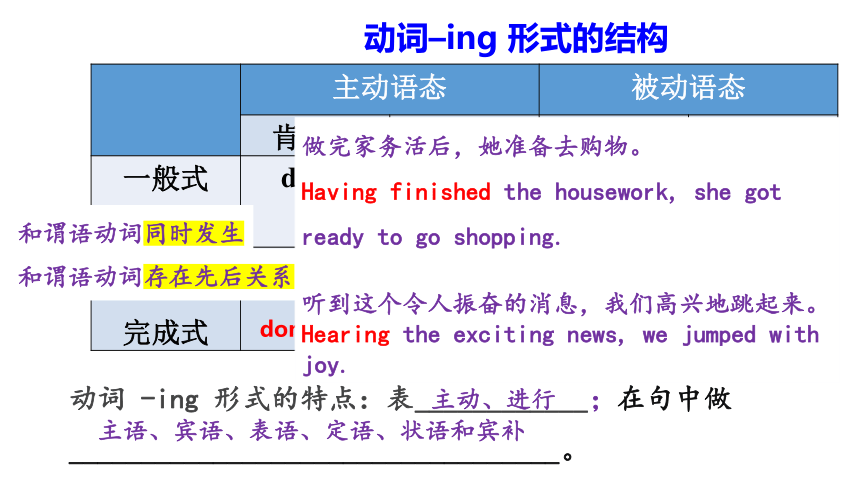
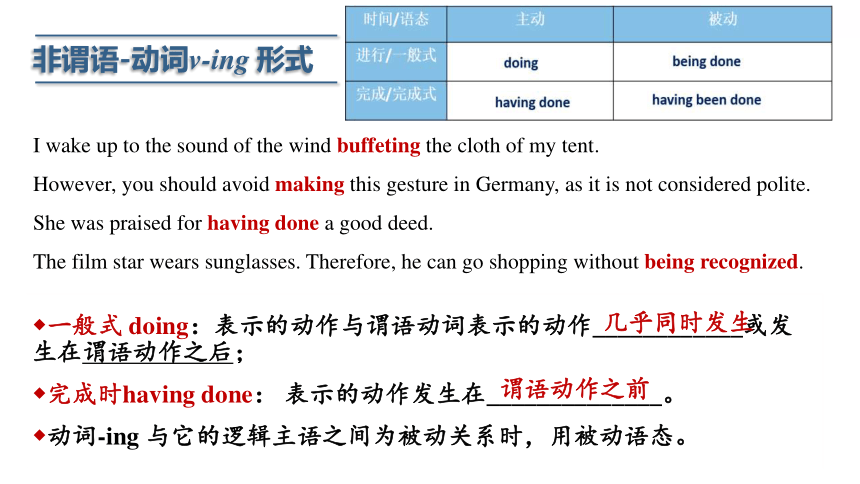
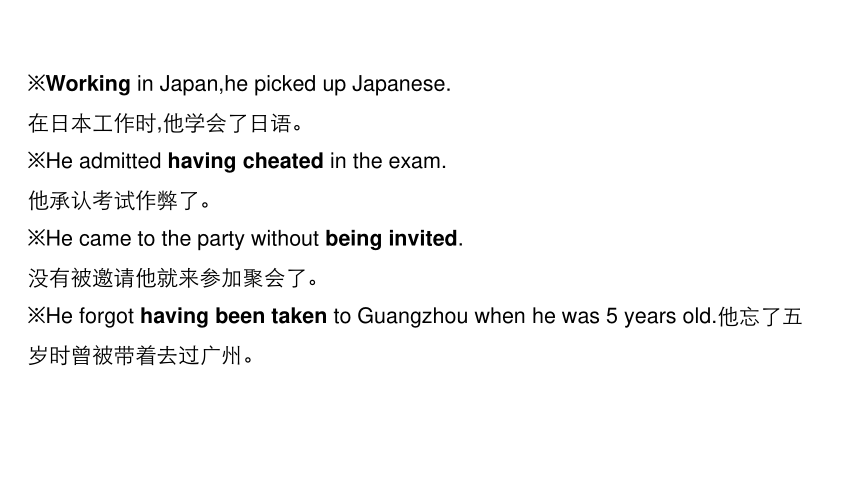
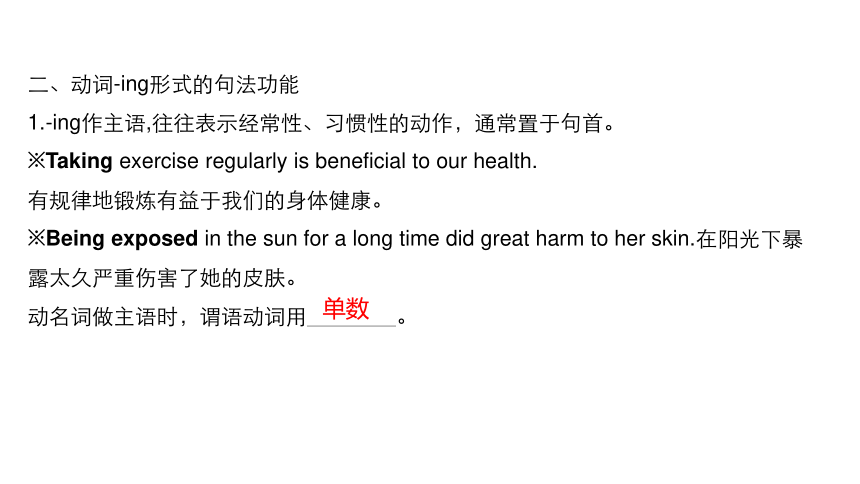
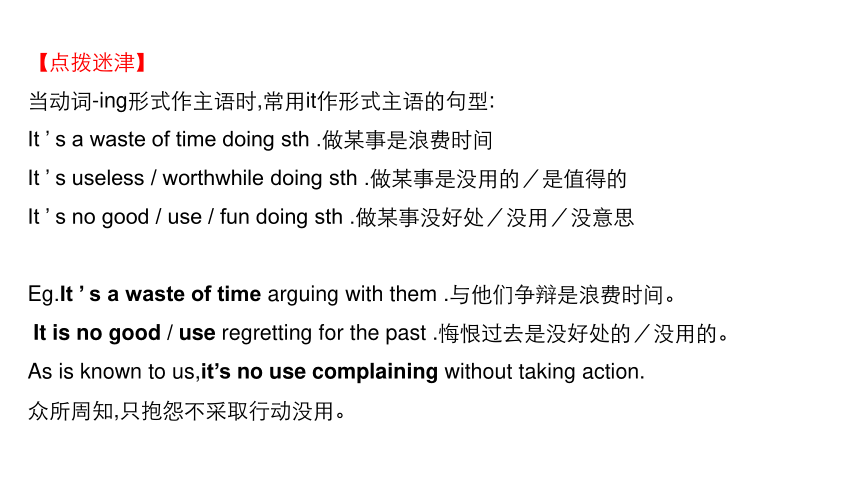
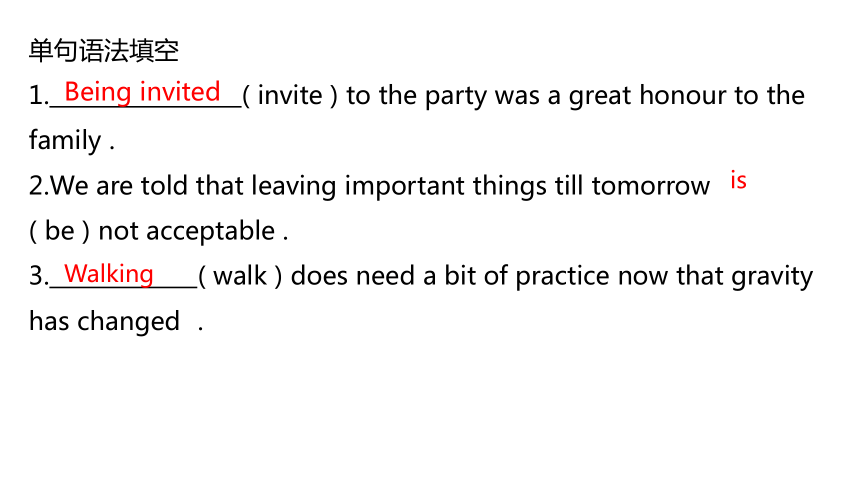
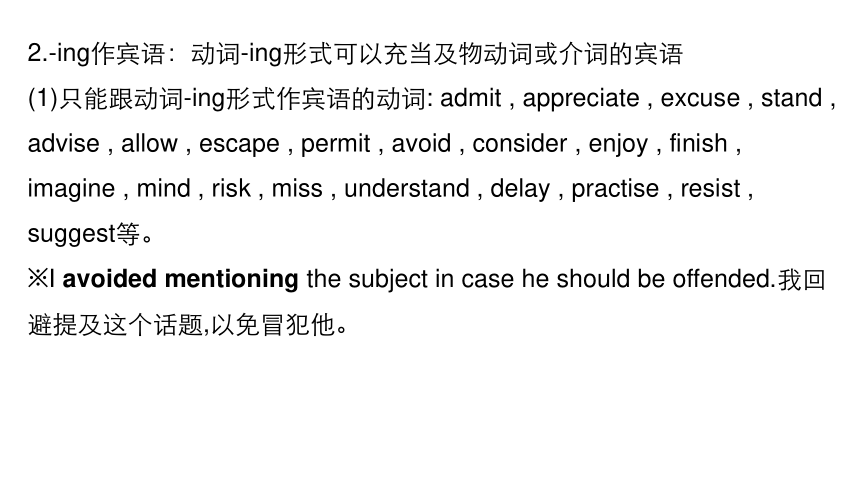
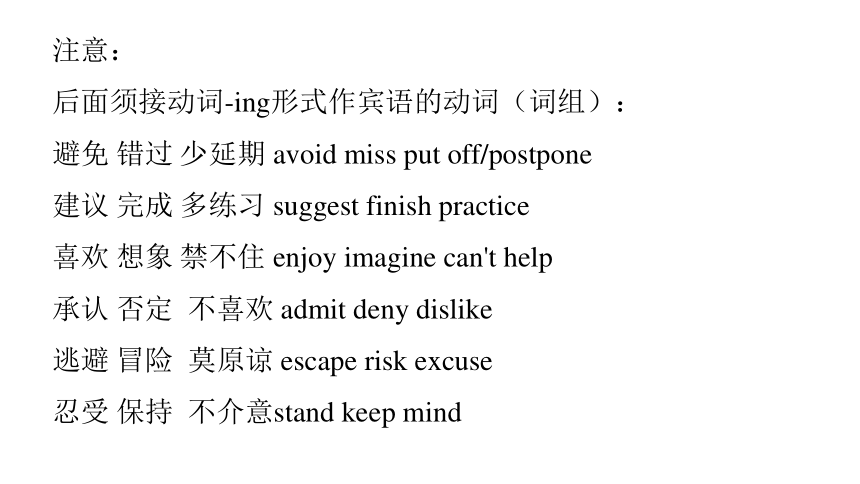
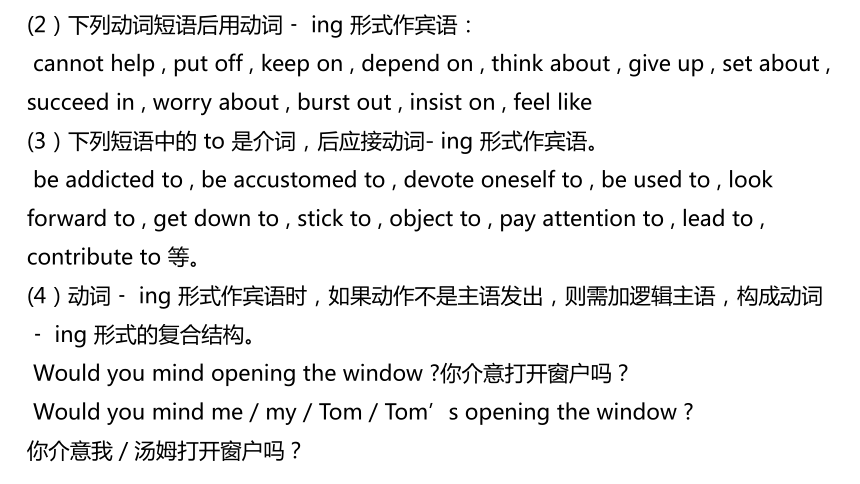
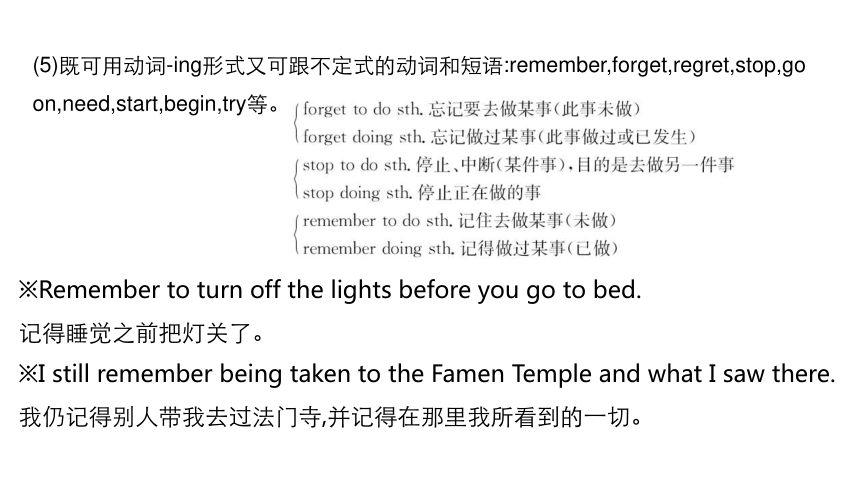
文档简介
(共33张PPT)
Unit 5 First Aid
Grammar
动词-ing的用法
阅读下面课文原句,分析黑体部分的用法
1.As you can imagine,getting burnt can lead to very serious injuries.
2.The first and most important step in the treatment of burns is giving first aid.
3.It is best to place burns under cool running water,especially within the first ten minutes.
4.Remove any clothes using scissors if necessary,unless you see the fabric sticking to the burnt skin.
5.You can protect the burnt area by covering it with a loose clean cloth.
作主语
作表语
作定语
作状语
作宾语
动词–ing 形式的结构
主动语态 被动语态
肯定式 否定式 肯定式 否定式
一般式 doing
完成式
not doing
being done
not being done
having done
not having done
having been done
not having been done
动词 -ing 形式的特点:表____________;在句中做
__________________________________。
主动、进行
主语、宾语、表语、定语、状语和宾补
和谓语动词同时发生
和谓语动词存在先后关系
做完家务活后,她准备去购物。
Having finished the housework, she got ready to go shopping.
听到这个令人振奋的消息,我们高兴地跳起来。
Hearing the exciting news, we jumped with joy.
非谓语-动词v-ing 形式
I wake up to the sound of the wind buffeting the cloth of my tent.
However, you should avoid making this gesture in Germany, as it is not considered polite.
She was praised for having done a good deed.
The film star wears sunglasses. Therefore, he can go shopping without being recognized.
◆一般式 doing:表示的动作与谓语动词表示的动作____________或发生在谓语动作之后;
◆完成时having done: 表示的动作发生在______________。
◆动词-ing 与它的逻辑主语之间为被动关系时,用被动语态。
几乎同时发生
谓语动作之前
※Working in Japan,he picked up Japanese.
在日本工作时,他学会了日语。
※He admitted having cheated in the exam.
他承认考试作弊了。
※He came to the party without being invited.
没有被邀请他就来参加聚会了。
※He forgot having been taken to Guangzhou when he was 5 years old.他忘了五岁时曾被带着去过广州。
二、动词-ing形式的句法功能
1.-ing作主语,往往表示经常性、习惯性的动作,通常置于句首。
※Taking exercise regularly is beneficial to our health.
有规律地锻炼有益于我们的身体健康。
※Being exposed in the sun for a long time did great harm to her skin.在阳光下暴露太久严重伤害了她的皮肤。
动名词做主语时,谓语动词用 。
单数
【点拨迷津】
当动词-ing形式作主语时,常用it作形式主语的句型:
It ’ s a waste of time doing sth .做某事是浪费时间
It ’ s useless / worthwhile doing sth .做某事是没用的/是值得的
It ’ s no good / use / fun doing sth .做某事没好处/没用/没意思
Eg.It ’ s a waste of time arguing with them .与他们争辩是浪费时间。
It is no good / use regretting for the past .悔恨过去是没好处的/没用的。
As is known to us,it’s no use complaining without taking action.
众所周知,只抱怨不采取行动没用。
单句语法填空
1. ( invite ) to the party was a great honour to the family .
2.We are told that leaving important things till tomorrow ( be ) not acceptable .
3. ( walk ) does need a bit of practice now that gravity has changed .
Being invited
is
Walking
2.-ing作宾语:动词-ing形式可以充当及物动词或介词的宾语
(1)只能跟动词-ing形式作宾语的动词: admit , appreciate , excuse , stand , advise , allow , escape , permit , avoid , consider , enjoy , finish , imagine , mind , risk , miss , understand , delay , practise , resist , suggest等。
※I avoided mentioning the subject in case he should be offended.我回避提及这个话题,以免冒犯他。
注意:
后面须接动词-ing形式作宾语的动词(词组):
避免 错过 少延期 avoid miss put off/postpone
建议 完成 多练习 suggest finish practice
喜欢 想象 禁不住 enjoy imagine can't help
承认 否定 不喜欢 admit deny dislike
逃避 冒险 莫原谅 escape risk excuse
忍受 保持 不介意stand keep mind
(2)下列动词短语后用动词﹣ ing 形式作宾语:
cannot help , put off , keep on , depend on , think about , give up , set about , succeed in , worry about , burst out , insist on , feel like
(3)下列短语中的 to 是介词,后应接动词- ing 形式作宾语。
be addicted to , be accustomed to , devote oneself to , be used to , look forward to , get down to , stick to , object to , pay attention to , lead to , contribute to 等。
(4)动词﹣ ing 形式作宾语时,如果动作不是主语发出,则需加逻辑主语,构成动词﹣ ing 形式的复合结构。
Would you mind opening the window 你介意打开窗户吗?
Would you mind me / my / Tom / Tom’s opening the window
你介意我/汤姆打开窗户吗?
(5)既可用动词-ing形式又可跟不定式的动词和短语:remember,forget,regret,stop,go on,need,start,begin,try等。
※Remember to turn off the lights before you go to bed.
记得睡觉之前把灯关了。
※I still remember being taken to the Famen Temple and what I saw there.
我仍记得别人带我去过法门寺,并记得在那里我所看到的一切。
(6)在以下结构中,动词﹣ ing 形式作介词的宾语,介词常省略。
spend ...( in ) doing sth .花费………做某事
have difficulty / trouble ( in ) doing 做......有困难/麻烦
stop / prevent ...( from ) doing sth .阻止......做某事
waste time ( in ) doing sth .浪费时间做某事
be busy ( in ) doing sth .忙于做某事
have a good / hard time ( in ) doing sth .高兴做某事/费了很大劲做某事
There is no point ( in ) doing sth .做某事毫无意义
语法填空
(1)Please remember _______(bring) me the book I want next time.
(2)My grandfather always forgets ______(take) the keys but he always says that he remembers ______ (take)them.
(3)Her little son needs ______ (take)care of.
(4)I didn’t mean _____ (eat) anything but the ice cream looked so good that I couldn’t help ______ (try) it.
(5)Can you imagine the difficulty I had _______(solve)the problem
to bring
to take
taking
taking
to eat
trying
solving
3.-ing作表语
※In the ant city,the queen’s job is laying eggs.
在蚂蚁王国,蚁后的职责就是产卵。
※Studying abroad is both challenging and rewarding.
出国学习既有挑战性又有回报。
※The news was exciting and we were excited the whole night.
这则消息令人激动,我们激动了整整一晚上。
【点拨】
-ing作表语时,通常位于 。
作用:表示主语的具体内容(身份、性质或情况);表示主语的性质和特征,通常是分词形容词,如:moving,surprising,interesting 等。
系动词之后
【内化·用】语法填空。
(1)His concern for his mother is most ________ (touch).
(2)Seeing is ________(believe).
(3)Her words are ___________(encourage).
touching
believing
encouraging
4.-ing作补语
动词-ing形式作补足语分两种情况:
(1)形容词性质的动词-ing形式作补足语:
※I find the book very interesting.
我发现这本书非常有趣。(宾语补足语)
※The boy is found very annoying.
发现这个男孩很令人讨厌。(主语补足语)
(2)动词性质的动词-ing形式作补足语:感官动词(词组)和使役动词(词组),如see,watch,hear,feel,notice,observe,look at,listen to,let,have,make,keep,get等后可以跟表示动作性质的动词-ing形式作补足语,表示“正在或持续做某事”。
※ I see him passing by a bank.
我看见他正经过一家银行。(宾语补足语)
※ He was seen working in the garden.
有人看见他正在花园里干活。(主语补足语)
5.-ing作定语
※There is a swimming pool in the backyard.
在后院有一个游泳池。
※It’s a fascinating city.这是一个迷人的城市。
※There is nothing interesting on TV today.
今天电视上没什么有意思的事。
※The only person standing in your way is you.
唯一阻碍你成功的人就是你自己。
【点拨】
(1)-ing与所修饰的名词之间的关系,逻辑主谓:名词发出-ing所表达的动作;
(2)-ing作定语的位置: 单个-ing 放在所修饰的名词前,若为-ing词组/短语放在名词后;
(3)-ing作定语表示实物的性质或用途;表主动表进行;
(4)动词-ing形式作定语相当于定语从句。
如:The people sleeping on the ground are doctors.
=The people who are sleeping on the ground are doctors.
睡在地上的那些人是医生。
单句语法填空
1.They are reading books in the ( read ) room .
2.The boy ( work ) in the store is my classmate .
3.When we got a call ( say ) she was short - listed , we thought it was a joke .(2019全国 I ,语法填空)
4.The topic ( discuss ) now has drawn some experts’attention .
reading
working
saying
being discussed
6.-ing作状语
动词的-ing形式作状语时,与谓语表示的动作(或状态)是同时或几乎同时发生的,有时先于谓语动词的动作发生。表示动作发生的时间、原因、条件、结果、让步、方式或伴随状况,相当于对应的状语从句或并列句。
※Seeing the grand gate of the Summer Palace,Mike felt quite amazed.(时间)
=When Mike saw the grand gate of the Summer Palace,he felt quite amazed.
当迈克看到颐和园的大门时,他感到非常吃惊。
※Having finished his speech,he answered our questions.(时间)
=After he had finished his speech,he answered our questions.
结束演讲后,他回答了我们的问题。
※ Being still weak,she couldn’t stay up for long.(原因)
=As she was still weak,she couldn’t stay up for long.
因为非常虚弱, 她不能长时间熬夜。
※I left a message on the board,expressing my best wishes to my hometown.(伴随)
=I left a message on the board and expressed my best wishes to my hometown.
我在留言板上留下信息,表达了对家乡的良好祝愿。
【点拨】
(1)-ing形式作状语时,其逻辑主语必须与主句中的主语一致且为主动关系。如果是和谓语动词的动作同时或紧随其后发生则用doing, 如果和谓语动词之间有明显的先后关系则用having done。
※ Seeing the main characters come on stage,I was surprised.
看到舞台上的主角,我非常吃惊。
※Having worked there for 30 years,he moved to London with his wife.
在那里工作了30年,然后他和他的妻子搬到了伦敦。
(2)-ing形式作状语时,可以在主句之前,也可以在主句之后。一般来说,表示时间、原因、条件时位于主句之前,表示结果、方式、伴随时位于主句之后。
※The fire lasted a whole night,causing great damage.
大火持续了一整夜,造成了很大破坏。
※Looking out of the window,I saw some children playing football.从窗户向外看,我看见孩子们在踢足球。
※The students walked out of the classroom,talking and laughing.学生们有说有笑地走出教室。
(3)-ing形式的否定形式在前面加not。
※Not realizing that he was in great danger,he walked deeper into the forest.
没有意识到处于很大的危险之中,他向森林更深处走去。
(4)-ing形式作状语时,有时为了强调前面可以加上连词或介词。
※She first came across this phenomenon while researching North American children living in India.在对住在印度的北美学生进行研究时,她首次碰到了这种现象。
※He resigned from the company before going abroad.
出国前,他从公司辞职。
※Upon hearing the news,he couldn’t help crying.
= As soon as he heard the news,he couldn’t help crying.
一听到这个消息,他就情不自禁地哭了。
(5)作评论性状语,有些惯用的动词-ing形式短语在句中可以独立存在,它们用来修饰全句,表明说话者的态度、观点等。常见的有 generally speaking一般来说,strictly speaking严格说来,roughly speaking大致说来,narrowly speaking狭义上说,judging from/ by由……判断。
※Judging from her accent,she must come from Australia.
从口音来判断,她一定来自澳大利亚。
总结
-ing的用法非常广泛,它可以作主语、宾语、表语、定语、状语、补足语等成分。其中作定语和状语考查最多。-ing形式往往表主动, 表进行。在作状语时,当与谓语动词有明显先后关系时常用having done形式 ,-ing形式通常可以转换成相对应的定语从句,状语从句等。
Activity 1 Fill the blanks.
(slip) into bad eating habits may affect people’s physical and mental health.
It is a waste of time (persuade) such a person to join us.
He thought he could ease the pain by (wrap) his swollen ankle with loose clean fabric.
This is done to avoid (damage) the nerves underneath the skin layer.
The ant queen’s full-time job is (lay) eggs.
We’ve received an urgent message (say) that your father ill.
Slipping
persuading
wrapping
damaging
laying
saying
7. He didn’t hesitate for a minute to save the (drown) child.
8. If you see someone (choke), first call the emergency services.
9. (grab) the side of the bed, he helped himself to his feet.
10. “Congratulations!” he said, (slap) me on the back.
11. (smoke) too much, he has suffered from lung cancer.
12. (receive) an answer, he decided to write another letter.
drowning
Grabbing
slapping
Having smoked
Not having received
choking
Mrs Taylor was an elderly woman ______ (live) alone. One day, she fell on the floor when ______ (dry) her hair. Fortunately, she could stand up on her own because of ________ (not, get) hurt seriously. Then she walked slowly to the sofa, ________ (apply) some medicine to her skin. This experience made her aware of the importance of first-aid. Her mobile phone __________(set up) to call an emergency number at the push of a button. A few days later, Mrs Taylor was cleaning the windows in her living room when suddenly ________(fall) over onto the carpet. ______(lie) on the floor, Mrs Taylor reached her mobile phone with her left hand and dialed the emergency number by _______ (push) the emergency button. _________(pick) up the phone, the operator knew that Mrs Taylor must be in trouble so she immediately sent an ambulance. ___________ (stay) in the hospital for several days, Mrs Taylor was in no danger. this experience frightened Mrs Taylor, making her more careful during her life.
Activity 2: Complete the passage with the correct forms of the given words.
living
drying
not getting
applying
was set up
falling
Lying
pushing
Picking
Having stayed
Unit 5 First Aid
Grammar
动词-ing的用法
阅读下面课文原句,分析黑体部分的用法
1.As you can imagine,getting burnt can lead to very serious injuries.
2.The first and most important step in the treatment of burns is giving first aid.
3.It is best to place burns under cool running water,especially within the first ten minutes.
4.Remove any clothes using scissors if necessary,unless you see the fabric sticking to the burnt skin.
5.You can protect the burnt area by covering it with a loose clean cloth.
作主语
作表语
作定语
作状语
作宾语
动词–ing 形式的结构
主动语态 被动语态
肯定式 否定式 肯定式 否定式
一般式 doing
完成式
not doing
being done
not being done
having done
not having done
having been done
not having been done
动词 -ing 形式的特点:表____________;在句中做
__________________________________。
主动、进行
主语、宾语、表语、定语、状语和宾补
和谓语动词同时发生
和谓语动词存在先后关系
做完家务活后,她准备去购物。
Having finished the housework, she got ready to go shopping.
听到这个令人振奋的消息,我们高兴地跳起来。
Hearing the exciting news, we jumped with joy.
非谓语-动词v-ing 形式
I wake up to the sound of the wind buffeting the cloth of my tent.
However, you should avoid making this gesture in Germany, as it is not considered polite.
She was praised for having done a good deed.
The film star wears sunglasses. Therefore, he can go shopping without being recognized.
◆一般式 doing:表示的动作与谓语动词表示的动作____________或发生在谓语动作之后;
◆完成时having done: 表示的动作发生在______________。
◆动词-ing 与它的逻辑主语之间为被动关系时,用被动语态。
几乎同时发生
谓语动作之前
※Working in Japan,he picked up Japanese.
在日本工作时,他学会了日语。
※He admitted having cheated in the exam.
他承认考试作弊了。
※He came to the party without being invited.
没有被邀请他就来参加聚会了。
※He forgot having been taken to Guangzhou when he was 5 years old.他忘了五岁时曾被带着去过广州。
二、动词-ing形式的句法功能
1.-ing作主语,往往表示经常性、习惯性的动作,通常置于句首。
※Taking exercise regularly is beneficial to our health.
有规律地锻炼有益于我们的身体健康。
※Being exposed in the sun for a long time did great harm to her skin.在阳光下暴露太久严重伤害了她的皮肤。
动名词做主语时,谓语动词用 。
单数
【点拨迷津】
当动词-ing形式作主语时,常用it作形式主语的句型:
It ’ s a waste of time doing sth .做某事是浪费时间
It ’ s useless / worthwhile doing sth .做某事是没用的/是值得的
It ’ s no good / use / fun doing sth .做某事没好处/没用/没意思
Eg.It ’ s a waste of time arguing with them .与他们争辩是浪费时间。
It is no good / use regretting for the past .悔恨过去是没好处的/没用的。
As is known to us,it’s no use complaining without taking action.
众所周知,只抱怨不采取行动没用。
单句语法填空
1. ( invite ) to the party was a great honour to the family .
2.We are told that leaving important things till tomorrow ( be ) not acceptable .
3. ( walk ) does need a bit of practice now that gravity has changed .
Being invited
is
Walking
2.-ing作宾语:动词-ing形式可以充当及物动词或介词的宾语
(1)只能跟动词-ing形式作宾语的动词: admit , appreciate , excuse , stand , advise , allow , escape , permit , avoid , consider , enjoy , finish , imagine , mind , risk , miss , understand , delay , practise , resist , suggest等。
※I avoided mentioning the subject in case he should be offended.我回避提及这个话题,以免冒犯他。
注意:
后面须接动词-ing形式作宾语的动词(词组):
避免 错过 少延期 avoid miss put off/postpone
建议 完成 多练习 suggest finish practice
喜欢 想象 禁不住 enjoy imagine can't help
承认 否定 不喜欢 admit deny dislike
逃避 冒险 莫原谅 escape risk excuse
忍受 保持 不介意stand keep mind
(2)下列动词短语后用动词﹣ ing 形式作宾语:
cannot help , put off , keep on , depend on , think about , give up , set about , succeed in , worry about , burst out , insist on , feel like
(3)下列短语中的 to 是介词,后应接动词- ing 形式作宾语。
be addicted to , be accustomed to , devote oneself to , be used to , look forward to , get down to , stick to , object to , pay attention to , lead to , contribute to 等。
(4)动词﹣ ing 形式作宾语时,如果动作不是主语发出,则需加逻辑主语,构成动词﹣ ing 形式的复合结构。
Would you mind opening the window 你介意打开窗户吗?
Would you mind me / my / Tom / Tom’s opening the window
你介意我/汤姆打开窗户吗?
(5)既可用动词-ing形式又可跟不定式的动词和短语:remember,forget,regret,stop,go on,need,start,begin,try等。
※Remember to turn off the lights before you go to bed.
记得睡觉之前把灯关了。
※I still remember being taken to the Famen Temple and what I saw there.
我仍记得别人带我去过法门寺,并记得在那里我所看到的一切。
(6)在以下结构中,动词﹣ ing 形式作介词的宾语,介词常省略。
spend ...( in ) doing sth .花费………做某事
have difficulty / trouble ( in ) doing 做......有困难/麻烦
stop / prevent ...( from ) doing sth .阻止......做某事
waste time ( in ) doing sth .浪费时间做某事
be busy ( in ) doing sth .忙于做某事
have a good / hard time ( in ) doing sth .高兴做某事/费了很大劲做某事
There is no point ( in ) doing sth .做某事毫无意义
语法填空
(1)Please remember _______(bring) me the book I want next time.
(2)My grandfather always forgets ______(take) the keys but he always says that he remembers ______ (take)them.
(3)Her little son needs ______ (take)care of.
(4)I didn’t mean _____ (eat) anything but the ice cream looked so good that I couldn’t help ______ (try) it.
(5)Can you imagine the difficulty I had _______(solve)the problem
to bring
to take
taking
taking
to eat
trying
solving
3.-ing作表语
※In the ant city,the queen’s job is laying eggs.
在蚂蚁王国,蚁后的职责就是产卵。
※Studying abroad is both challenging and rewarding.
出国学习既有挑战性又有回报。
※The news was exciting and we were excited the whole night.
这则消息令人激动,我们激动了整整一晚上。
【点拨】
-ing作表语时,通常位于 。
作用:表示主语的具体内容(身份、性质或情况);表示主语的性质和特征,通常是分词形容词,如:moving,surprising,interesting 等。
系动词之后
【内化·用】语法填空。
(1)His concern for his mother is most ________ (touch).
(2)Seeing is ________(believe).
(3)Her words are ___________(encourage).
touching
believing
encouraging
4.-ing作补语
动词-ing形式作补足语分两种情况:
(1)形容词性质的动词-ing形式作补足语:
※I find the book very interesting.
我发现这本书非常有趣。(宾语补足语)
※The boy is found very annoying.
发现这个男孩很令人讨厌。(主语补足语)
(2)动词性质的动词-ing形式作补足语:感官动词(词组)和使役动词(词组),如see,watch,hear,feel,notice,observe,look at,listen to,let,have,make,keep,get等后可以跟表示动作性质的动词-ing形式作补足语,表示“正在或持续做某事”。
※ I see him passing by a bank.
我看见他正经过一家银行。(宾语补足语)
※ He was seen working in the garden.
有人看见他正在花园里干活。(主语补足语)
5.-ing作定语
※There is a swimming pool in the backyard.
在后院有一个游泳池。
※It’s a fascinating city.这是一个迷人的城市。
※There is nothing interesting on TV today.
今天电视上没什么有意思的事。
※The only person standing in your way is you.
唯一阻碍你成功的人就是你自己。
【点拨】
(1)-ing与所修饰的名词之间的关系,逻辑主谓:名词发出-ing所表达的动作;
(2)-ing作定语的位置: 单个-ing 放在所修饰的名词前,若为-ing词组/短语放在名词后;
(3)-ing作定语表示实物的性质或用途;表主动表进行;
(4)动词-ing形式作定语相当于定语从句。
如:The people sleeping on the ground are doctors.
=The people who are sleeping on the ground are doctors.
睡在地上的那些人是医生。
单句语法填空
1.They are reading books in the ( read ) room .
2.The boy ( work ) in the store is my classmate .
3.When we got a call ( say ) she was short - listed , we thought it was a joke .(2019全国 I ,语法填空)
4.The topic ( discuss ) now has drawn some experts’attention .
reading
working
saying
being discussed
6.-ing作状语
动词的-ing形式作状语时,与谓语表示的动作(或状态)是同时或几乎同时发生的,有时先于谓语动词的动作发生。表示动作发生的时间、原因、条件、结果、让步、方式或伴随状况,相当于对应的状语从句或并列句。
※Seeing the grand gate of the Summer Palace,Mike felt quite amazed.(时间)
=When Mike saw the grand gate of the Summer Palace,he felt quite amazed.
当迈克看到颐和园的大门时,他感到非常吃惊。
※Having finished his speech,he answered our questions.(时间)
=After he had finished his speech,he answered our questions.
结束演讲后,他回答了我们的问题。
※ Being still weak,she couldn’t stay up for long.(原因)
=As she was still weak,she couldn’t stay up for long.
因为非常虚弱, 她不能长时间熬夜。
※I left a message on the board,expressing my best wishes to my hometown.(伴随)
=I left a message on the board and expressed my best wishes to my hometown.
我在留言板上留下信息,表达了对家乡的良好祝愿。
【点拨】
(1)-ing形式作状语时,其逻辑主语必须与主句中的主语一致且为主动关系。如果是和谓语动词的动作同时或紧随其后发生则用doing, 如果和谓语动词之间有明显的先后关系则用having done。
※ Seeing the main characters come on stage,I was surprised.
看到舞台上的主角,我非常吃惊。
※Having worked there for 30 years,he moved to London with his wife.
在那里工作了30年,然后他和他的妻子搬到了伦敦。
(2)-ing形式作状语时,可以在主句之前,也可以在主句之后。一般来说,表示时间、原因、条件时位于主句之前,表示结果、方式、伴随时位于主句之后。
※The fire lasted a whole night,causing great damage.
大火持续了一整夜,造成了很大破坏。
※Looking out of the window,I saw some children playing football.从窗户向外看,我看见孩子们在踢足球。
※The students walked out of the classroom,talking and laughing.学生们有说有笑地走出教室。
(3)-ing形式的否定形式在前面加not。
※Not realizing that he was in great danger,he walked deeper into the forest.
没有意识到处于很大的危险之中,他向森林更深处走去。
(4)-ing形式作状语时,有时为了强调前面可以加上连词或介词。
※She first came across this phenomenon while researching North American children living in India.在对住在印度的北美学生进行研究时,她首次碰到了这种现象。
※He resigned from the company before going abroad.
出国前,他从公司辞职。
※Upon hearing the news,he couldn’t help crying.
= As soon as he heard the news,he couldn’t help crying.
一听到这个消息,他就情不自禁地哭了。
(5)作评论性状语,有些惯用的动词-ing形式短语在句中可以独立存在,它们用来修饰全句,表明说话者的态度、观点等。常见的有 generally speaking一般来说,strictly speaking严格说来,roughly speaking大致说来,narrowly speaking狭义上说,judging from/ by由……判断。
※Judging from her accent,she must come from Australia.
从口音来判断,她一定来自澳大利亚。
总结
-ing的用法非常广泛,它可以作主语、宾语、表语、定语、状语、补足语等成分。其中作定语和状语考查最多。-ing形式往往表主动, 表进行。在作状语时,当与谓语动词有明显先后关系时常用having done形式 ,-ing形式通常可以转换成相对应的定语从句,状语从句等。
Activity 1 Fill the blanks.
(slip) into bad eating habits may affect people’s physical and mental health.
It is a waste of time (persuade) such a person to join us.
He thought he could ease the pain by (wrap) his swollen ankle with loose clean fabric.
This is done to avoid (damage) the nerves underneath the skin layer.
The ant queen’s full-time job is (lay) eggs.
We’ve received an urgent message (say) that your father ill.
Slipping
persuading
wrapping
damaging
laying
saying
7. He didn’t hesitate for a minute to save the (drown) child.
8. If you see someone (choke), first call the emergency services.
9. (grab) the side of the bed, he helped himself to his feet.
10. “Congratulations!” he said, (slap) me on the back.
11. (smoke) too much, he has suffered from lung cancer.
12. (receive) an answer, he decided to write another letter.
drowning
Grabbing
slapping
Having smoked
Not having received
choking
Mrs Taylor was an elderly woman ______ (live) alone. One day, she fell on the floor when ______ (dry) her hair. Fortunately, she could stand up on her own because of ________ (not, get) hurt seriously. Then she walked slowly to the sofa, ________ (apply) some medicine to her skin. This experience made her aware of the importance of first-aid. Her mobile phone __________(set up) to call an emergency number at the push of a button. A few days later, Mrs Taylor was cleaning the windows in her living room when suddenly ________(fall) over onto the carpet. ______(lie) on the floor, Mrs Taylor reached her mobile phone with her left hand and dialed the emergency number by _______ (push) the emergency button. _________(pick) up the phone, the operator knew that Mrs Taylor must be in trouble so she immediately sent an ambulance. ___________ (stay) in the hospital for several days, Mrs Taylor was in no danger. this experience frightened Mrs Taylor, making her more careful during her life.
Activity 2: Complete the passage with the correct forms of the given words.
living
drying
not getting
applying
was set up
falling
Lying
pushing
Picking
Having stayed
